Hot water is the unsung hero of daily life, and after wrestling with a failing unit, I knew it was time for a change. Enter the Rheem water heater—a brand that’s been a game-changer for my household.
With its blend of efficiency, durability, and smart features, it’s a solid investment for anyone craving reliable hot water. Whether you’re upgrading or replacing an old clunker, Rheem’s range of tank, tankless, and hybrid models offers something for every home.
Trust me, you’ll want to keep reading to see why this is the water heater you need.
My Journey With A Rheem Water Heater
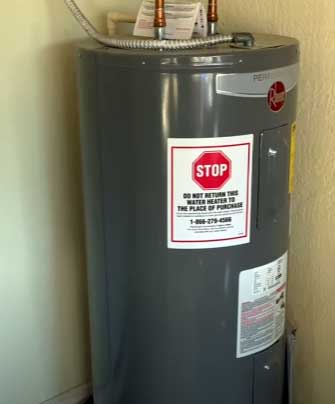
Let me take you back to last winter when my old water heater decided to throw in the towel.
Picture this: it’s 6 a.m., I’m gearing up for a hot shower to kickstart my day, and all I get is a trickle of icy water. Frustrating?
You bet. After some research and a few chats with local plumbers, I landed on the Rheem Performance Platinum 50-Gallon Natural Gas Water Heater.
It promised robust performance, energy efficiency, and a 12-year warranty—music to my ears.
Installing it was a breeze, thanks to my trusty plumber, who noted that Rheem’s design makes setup straightforward. The unit’s compact enough to fit in my basement without hogging space, and the push-button ignition meant no fiddling with pilot lights.
Within hours, I had hot water flowing again, and let me tell you, that first shower was glorious. The heater delivers a solid 77 gallons in the first hour, more than enough for my family of four, even when my teenagers decide to take marathon showers.
What stood out was the EcoNet app. I’m no tech wizard, but being able to tweak the temperature from my phone or get maintenance alerts felt like living in the future. Once, it pinged me about a potential leak, which turned out to be a loose fitting—crisis averted.
The unit’s energy efficiency also shaved a noticeable chunk off my gas bill, which, let’s be honest, is a win in today’s economy. After a year of use, I’m hooked, but like any product, it’s got its quirks. Let’s break down what makes Rheem shine and where it stumbles.
Pros of Rheem Water Heaters
- Energy Efficiency That Saves You Money
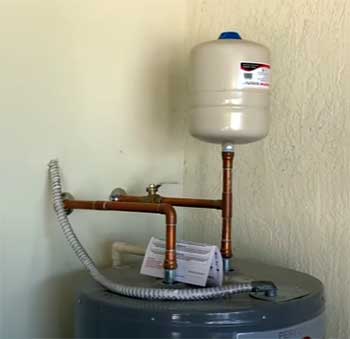
Rheem’s focus on energy efficiency is a big reason I chose their heater.
Models like the Performance Platinum have a Uniform Energy Factor (UEF) of up to 0.65 for gas units and over 3.5 for hybrids, which means less energy wasted and more savings for you.
My gas bill dropped by about 15% compared to my old unit, and Energy Star-rated models like the Rheem Hybrid Heat Pump can save you nearly $500 a year compared to standard electric tanks.
That’s real money back in your pocket, especially if you’re running a busy household.
- Wide Range of Options
Whether you’ve got a sprawling house or a cozy apartment, Rheem’s got you covered. Their lineup includes tank heaters (29 to 98 gallons), tankless models for endless hot water, and hybrids that combine the best of both worlds.
I went with a 50-gallon tank because it suits my family’s needs, but if you’re short on space, their tankless RTEX-18 is a compact powerhouse. Rheem even offers solar and commercial options, so you’re not stuck with a one-size-fits-all solution.
- Durability and Long Warranties
Rheem builds heaters to last. Their Marathon series, with its rust-proof polybutene tank, comes with a lifetime warranty—yes, you read that right. My Performance Platinum has a 12-year warranty, which gave me peace of mind knowing I wouldn’t be shelling out for repairs anytime soon.
The stainless steel elements and corrosion-resistant designs mean these units can handle years of heavy use without rusting or leaking, unlike my old heater that gave up after a decade.
- Smart Technology for Modern Living
I love gadgets that make life easier, and Rheem’s smart features deliver. The EcoNet app lets you monitor energy usage, adjust temperatures, and get alerts for maintenance or leaks.
One time, I got a notification about a potential issue while I was at work, and I could shut off the water remotely to avoid a mess. Wi-Fi connectivity isn’t just a gimmick—it’s a game-changer for keeping your heater running smoothly.
- Easy Installation and Maintenance
Rheem designs their heaters with pros in mind, which means less hassle for you. My plumber raved about how straightforward the installation was, thanks to clear instructions and accessible components.
Maintenance is low-key too—no filters to replace on my gas model, and features like the Guardian System (which shuts off the unit if it detects flammable vapors) add an extra layer of safety. You’ll spend less time and money keeping your heater in top shape.
Not-So-Good Parts of Rheem Water Heaters
- Warranty Woes and Customer Service
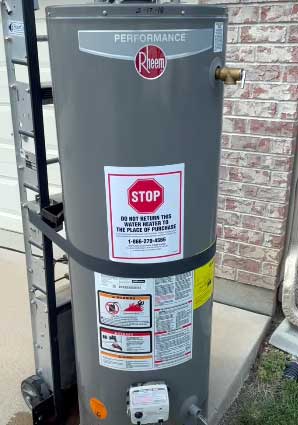
While Rheem’s warranties are generous, they come with fine print that can trip you up.
For instance, I learned that warranties don’t transfer to new homeowners, which could be a bummer if you sell your house.
Also, some folks report long wait times for customer service—think hours on hold.
I haven’t had to deal with this myself, but reviews mention inconsistent support, with some reps being less helpful than others.
It’s not a dealbreaker, but it’s worth knowing before you buy.
- Initial Cost Can Sting
Rheem’s upfront cost isn’t always budget-friendly. My Performance Platinum set me back about $1,200, including installation, which is pricier than some basic models from other brands. Hybrids and tankless units can climb to $2,500 or more.
While the energy savings add up over time, the initial hit might make you wince if you’re on a tight budget. Financing options can help, but you’ll need to plan ahead.
- Occasional Quality Concerns
Not every Rheem unit is flawless. Some users, including a few on ConsumerAffairs, report issues like leaks or faulty components within a few years. My unit’s been solid, but I read about a 3-year-old electric heater that leaked and another where the controller failed after two years.
These seem like outliers, but they suggest quality control isn’t always perfect. Professional installation can mitigate some risks, but it’s something to keep in mind.
- Slower Recovery for Electric Models
If you go for an electric Rheem, like the Marathon, be prepared for slower recovery times compared to gas models. My gas heater churns out hot water fast, but electric units can take up to 21 gallons per hour to reheat, which might leave you waiting if you’ve got a house full of guests.
It’s not a huge issue for smaller households, but if you’re running a busy home, a gas or hybrid model might be a better bet.
Maintenance Tips For Your Rheem Water Heater
- Flush the Tank Regularly
Sediment buildup is the enemy of any water heater, and Rheem’s no exception. I flush my tank every six months to keep it running smoothly. It’s simple: turn off the power or gas, connect a garden hose to the drain valve, and let the water flow until it’s clear.
This prevents rust and improves efficiency. Rheem’s technical bulletin (1202) spells it out clearly, and I’ve found it takes less than 30 minutes. You’ll thank yourself when your heater lasts longer.
- Check the Anode Rod
The anode rod is your heater’s unsung hero, sacrificing itself to prevent tank corrosion. I check mine yearly by turning off the water and power, then unscrewing the rod (usually at the top of the tank). If it’s less than half an inch thick or coated in calcium, it’s time to replace it.
Rheem’s bulletin (1201) explains how this rod protects your tank, and swapping it out every 2-3 years can add years to your heater’s life.
- Inspect for Leaks and Corrosion
I make it a habit to check my heater for leaks every few months. Look around the base, fittings, and pressure relief valve for any drips or rust. My EcoNet app caught a minor issue early, but a visual check works too. If you spot corrosion or water pooling, call a pro ASAP.
Rheem’s designs are tough, but catching problems early saves you from costly repairs down the road.
- Adjust the Temperature
Rheem lets you tweak the temperature easily, but don’t crank it too high. I keep mine at 120°F to balance comfort and safety—hot enough for showers but not so hot it risks scalding or overworks the unit.
Use the EcoNet app or the knob on tankless models to fine-tune. Rheem’s bulletin (1203) notes that this also affects energy use, so experiment to find your sweet spot.
- Schedule Professional Checkups
Even with Rheem’s low-maintenance designs, a pro should check your heater every 1-2 years. They’ll test the pressure relief valve, inspect the burner (for gas models), and ensure everything’s up to code.
My plumber caught a minor gas valve issue during a routine check, which saved me from a bigger headache. It’s worth the cost to keep your warranty valid and your heater humming.
Comparing Rheem To Other Brands
I’ve put Rheem head-to-head against Reliance, American Standard, and State water heaters to see which one comes out on top.
By comparing specific models—Rheem’s Performance Platinum 50-Gallon Gas, Reliance’s 6 50 GRS, American Standard’s ProLine XE 50-Gallon Gas, and State’s Select 50-Gallon Gas—I’ll break down energy efficiency, range, durability, smart features, and price under each matchup.
My research, chats with plumbers, and user reviews paint a clear picture to help you choose the right heater for your home.
Rheem Performance Platinum Vs. Reliance 6 50 GRS
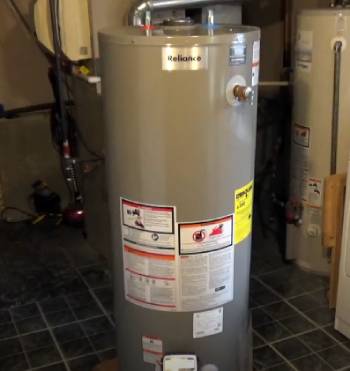
- Energy Efficiency: Rheem’s Performance Platinum boasts a 0.65 Uniform Energy Factor (UEF), cutting my gas bill by about 15% compared to my old unit. Its Energy Star certification means serious savings over time. Reliance’s 6 50 GRS, a budget model, hits a 0.62 UEF—decent but less efficient. You’ll save less with Reliance, especially in high-use homes, as it lacks the advanced burner tech Rheem uses.
- Product Range: Rheem offers tanks (29-98 gallons), tankless, and hybrids, giving me flexibility to pick a 50-gallon tank for my family of four. Reliance sticks to 30-50-gallon gas and electric tanks, with no tankless or hybrid options. If you need variety or space-saving designs, Rheem’s broader lineup wins.
- Durability and Warranties: Rheem’s 12-year warranty on the Performance Platinum gave me peace of mind, and its corrosion-resistant design feels built to last. Reliance offers a 6-year warranty, and some users report leaks after 5-7 years. Rheem’s sturdier components and longer warranty make it more reliable.
- Smart Features: Rheem’s EcoNet app lets me tweak settings and get leak alerts from my phone—a lifesaver when I caught a loose fitting early. Reliance has no smart tech, just a basic thermostat. If you love connectivity, Rheem’s modern features are a game-changer.
- Price and Value: Rheem’s Performance Platinum cost me $1,200 installed, but its savings and tech justify the price. Reliance’s 6 50 GRS is cheaper at $500-$800, but shorter warranties and less efficiency reduce its long-term value. Rheem’s the better investment.
Rheem Performance Platinum Vs. American Standard ProLine XE
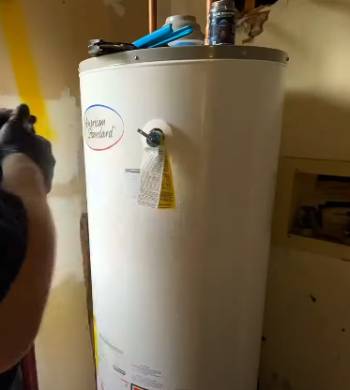
- Energy Efficiency: Rheem’s 0.65 UEF and Energy Star rating keep running costs low, saving me $100 yearly. American Standard’s ProLine XE matches at 0.65 UEF, but its lack of hybrid options means you miss out on bigger savings (Rheem’s hybrids hit 3.5 UEF). Rheem edges out for efficiency versatility.
- Product Range: Rheem’s tanks, tankless (like the RTEX-18), and hybrids cover all bases. American Standard offers 30-50-gallon tanks and a few tankless models (ATX-24, 4 GPM), but their range is narrower. Rheem’s higher-flow tankless (4.4 GPM) and hybrids give it more flexibility.
- Durability and Warranties: Rheem’s 12-year warranty and rust-resistant build promise longevity. American Standard’s ProLine XE has a 10-year warranty, but reviews note rust issues after 8 years. Rheem’s longer warranty and tougher design make it more dependable.
- Smart Features: Rheem’s EcoNet app is intuitive, with real-time alerts and remote control. American Standard’s Wi-Fi on the ProLine XE is clunky, with setup issues and no proactive alerts. Rheem’s polished tech makes it the smarter choice.
- Price and Value: Rheem’s $1,200 price tag is steep but balanced by savings and a long warranty. American Standard’s ProLine XE runs $800-$1,500, but shorter warranties and weaker efficiency tip the value toward Rheem.
Rheem Performance Platinum Vs. State Water Heater
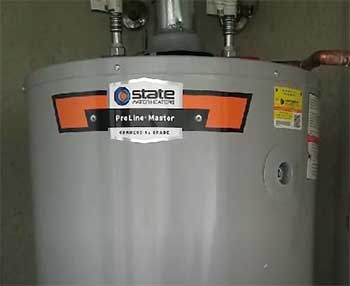
- Energy Efficiency: Rheem’s 0.65 UEF delivers solid savings, and its hybrids reach 3.5 UEF for bigger cuts. State’s Select gas model lags at 0.60 UEF, though their Premier Hybrid hits 3.55 UEF. Rheem’s range of efficient options at various prices gives it a slight edge.
- Product Range: Rheem’s tanks, tankless, and hybrids fit any home. State offers 30-80-gallon tanks, tankless (3.5 GPM max), and hybrids, but their tankless flow rates fall short of Rheem’s 4.4 GPM. Rheem’s compact designs and broader range win for flexibility.
- Durability and Warranties: Rheem’s 12-year warranty and corrosion-resistant build are rock-solid. State’s Select has a 6-year warranty, though their hybrids offer 10 years. User reviews cite State hybrid compressor issues after 5 years, making Rheem’s consistency stand out.
- Smart Features: Rheem’s EcoNet app is seamless, with proactive alerts. State’s Wi-Fi on hybrids like the Premier is less reliable, with connectivity drops reported. Rheem’s user-friendly tech takes the lead.
- Price and Value: Rheem’s $1,200 cost is offset by savings and a long warranty. State’s Select is $600-$1,000, but hybrids hit $2,200. Rheem’s balance of price, features, and efficiency offers better overall value.
Rheem’s Performance Platinum consistently outperforms Reliance’s budget focus, American Standard’s limited range, and State’s pricier hybrids. Its tech, efficiency, and flexibility make it my top pick.
Frequently Asked Questions (FAQ)
Absolutely, Rheem’s a solid choice. Their focus on energy efficiency, long warranties (up to lifetime for Marathon models), and smart tech like the EcoNet app make them a favorite. They’ve been in the game since 1925, offering tank, tankless, and hybrid options that suit most homes. While some users report issues, my experience and most reviews praise their reliability and performance. If you want value and innovation, Rheem’s a safe bet.
The most frequent issue is inconsistent customer service and warranty disputes. Some users, like those on ConsumerAffairs, mention long wait times for support or warranties being voided due to strict terms, like removal before inspection. Leaks or faulty components pop up occasionally, especially in electric models, but professional installation and regular maintenance (like flushing the tank) can minimize these risks. My unit’s been trouble-free, but these complaints are worth noting.
Rheem heaters typically last 10-15 years for tank models, 15-20 years for tankless, and up to 30 years for Marathon models with proper maintenance. My Performance Platinum is still going strong after a year, and its 12-year warranty gives me confidence. Regular flushing and anode rod checks can extend lifespan significantly. Compared to the industry average of 12 years, Rheem’s durability is impressive, especially for their premium lines.
It’s a toss-up between Rheem, A.O. Smith, and Bradford White. Rheem’s reliable with strong warranties and smart tech, but A.O. Smith’s commercial-grade components and Bradford White’s Vitraglas lining are tough to beat for durability. Rinnai’s tankless models are also reliable but pricier. Based on my experience and reviews, Rheem’s a top contender for balancing reliability, cost, and features, but your needs (e.g., tank vs. tankless) should guide your choice.
Why Rheem Is The Smart Choice For Your Home?
After a year with my Rheem water heater, I’m convinced it’s a winner. Its energy efficiency, smart tech, and long warranties make it a no-brainer for anyone needing reliable hot water. From cozy apartments to big family homes, Rheem’s range has you covered.
Sure, it’s not perfect—customer service can be spotty, and the upfront cost stings—but the savings and peace of mind are worth it. If you’re ready for hot showers without the hassle, grab a Rheem. You won’t regret it.
